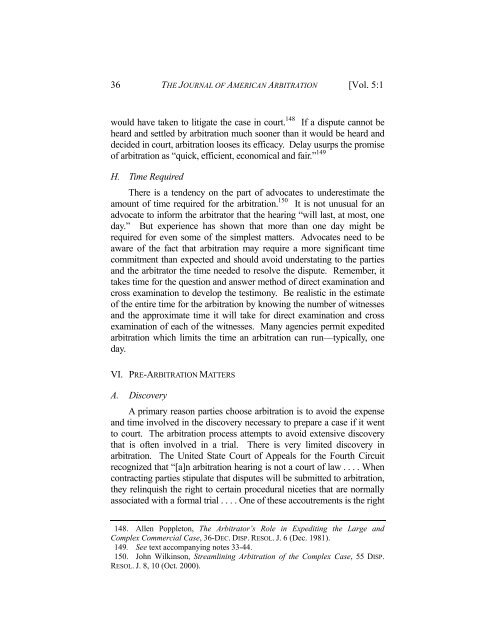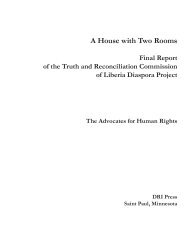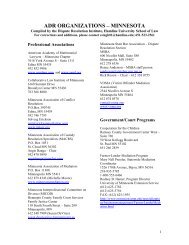2006/Vol. 5 No.1 - Hamline Law - Hamline University
2006/Vol. 5 No.1 - Hamline Law - Hamline University
2006/Vol. 5 No.1 - Hamline Law - Hamline University
Create successful ePaper yourself
Turn your PDF publications into a flip-book with our unique Google optimized e-Paper software.
36 THE JOURNAL OF AMERICAN ARBITRATION [<strong>Vol</strong>. 5:1<br />
would have taken to litigate the case in court. 148 If a dispute cannot be<br />
heard and settled by arbitration much sooner than it would be heard and<br />
decided in court, arbitration looses its efficacy. Delay usurps the promise<br />
of arbitration as “quick, efficient, economical and fair.” 149<br />
H. Time Required<br />
There is a tendency on the part of advocates to underestimate the<br />
amount of time required for the arbitration. 150 It is not unusual for an<br />
advocate to inform the arbitrator that the hearing “will last, at most, one<br />
day.” But experience has shown that more than one day might be<br />
required for even some of the simplest matters. Advocates need to be<br />
aware of the fact that arbitration may require a more significant time<br />
commitment than expected and should avoid understating to the parties<br />
and the arbitrator the time needed to resolve the dispute. Remember, it<br />
takes time for the question and answer method of direct examination and<br />
cross examination to develop the testimony. Be realistic in the estimate<br />
of the entire time for the arbitration by knowing the number of witnesses<br />
and the approximate time it will take for direct examination and cross<br />
examination of each of the witnesses. Many agencies permit expedited<br />
arbitration which limits the time an arbitration can run—typically, one<br />
day.<br />
VI. PRE-ARBITRATION MATTERS<br />
A. Discovery<br />
A primary reason parties choose arbitration is to avoid the expense<br />
and time involved in the discovery necessary to prepare a case if it went<br />
to court. The arbitration process attempts to avoid extensive discovery<br />
that is often involved in a trial. There is very limited discovery in<br />
arbitration. The United State Court of Appeals for the Fourth Circuit<br />
recognized that “[a]n arbitration hearing is not a court of law . . . . When<br />
contracting parties stipulate that disputes will be submitted to arbitration,<br />
they relinquish the right to certain procedural niceties that are normally<br />
associated with a formal trial . . . . One of these accoutrements is the right<br />
148. Allen Poppleton, The Arbitrator’s Role in Expediting the Large and<br />
Complex Commercial Case, 36-DEC. DISP. RESOL. J. 6 (Dec. 1981).<br />
149. See text accompanying notes 33-44.<br />
150. John Wilkinson, Streamlining Arbitration of the Complex Case, 55 DISP.<br />
RESOL. J. 8, 10 (Oct. 2000).
















